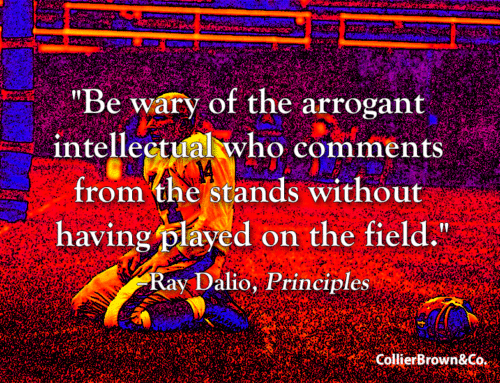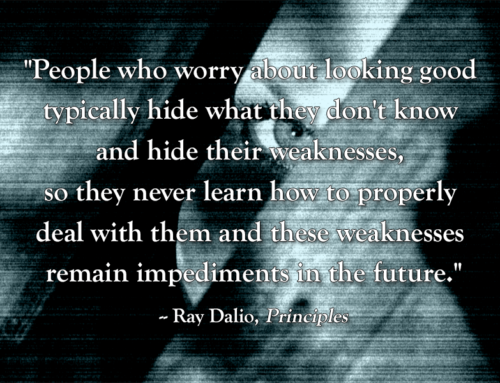In Good to Great, Jim Collins researched and codified a surprising fact: that leadership matters a great deal in taking organizations from good to great. He said that good-to-great leaders seemed to come from a completely different mold when compared to high-profile leaders with big personalities who make headlines and become celebrities. Self-effacing, quiet, reserved, even shy – so-called Level 5 leaders have a paradoxical blend of personal humility and profession will. They are more like Lincoln and Socrates than Patton or Caesar.
| Two Sides of Level 5 Leadership | |
| Professional Will | Personal Humility |
|
|
One repeating characteristic of Collins’ Level 5 leaders is their propensity to look out the window to apportion credit to factors outside themselves when things go well (and if they cannot find a specific person or event, they credit good luck). At the same time, they look in the mirror to apportion responsibility to themselves, never blaming bad luck, when things go poorly.
I appreciate and admire Collins’ research and findings. I further believe leadership is about building willing follower-ship. Level 5 leadership is one solution to that challenge. Like most things in life you can approach it the wrong way or the right way.
The wrong way often involves Balkanization – to divide a body into smaller mutually hostile groups – so that what seems on the surface like willing follower-ship actually involves manipulation, special consideration for favored groups and sanctions for disfavored groups, obfuscation in the name of clarity, drama-based role playing (victim, villain and rescuer) to curry favor with various groups at different times, assigning blame, avoiding responsibility, or other such behaviors.
The right way is grounded in three irreplaceable piers: character, competence, and communication (for more, see the next post), all in synch with Level 5 leadership.
A Level 5 failure example. On April 30, 2012, former U.S. Attorney General Michael Mukasey posted an op-ed in the Wall Street Journal regarding President Obama’s “bragging rights” regarding the killing of Osama bin Laden. Mukasey said, “A recently disclosed memorandum from then-CIA Director Leon Panetta shows that the president’s celebrated derring-do in authorizing the operation included a responsibility-escape clause: ‘The timing, operational decision making and control are in Admiral McRaven’s hands. The approval is provided on the risk profile presented to the President. Any additional risks are to be brought back to the President for his consideration. The direction is to go in and get bin Laden and if he is not there, to get out.’ Which is to say, if the mission went wrong, the fault would be Adm. McRaven’s, not the president’s.”
“While contemplating how the killing of bin Laden reflects on the president, consider the way he emphasized his own role in the hazardous mission accomplished by SEAL Team 6: ‘I directed Leon Panetta, the director of the CIA, to make the killing or capture of bin Laden the top priority . . . even as I continued our broader effort. . . . Then, after years of painstaking work by my intelligence community I was briefed . . . I met repeatedly with my national security team . . . And finally last week I determined that I had enough intelligence to take action. . . . Today, at my direction . . .'”
In contrast, “…George W. Bush, also had occasion during his presidency to announce to the nation a triumph of intelligence: the capture of Saddam Hussein. He called that success ‘a tribute to our men and women now serving in Iraq.’ He attributed it to ‘the superb work of intelligence analysts who found the dictator’s footprints in a vast country. The operation was carried out with skill and precision by a brave fighting force. Our servicemen and women and our coalition allies have faced many dangers. . . . Their work continues, and so do the risks.'”
“Lincoln took responsibility in August 1862 for failures that had been attributed to General George McClellan—eventually sacked for incompetence—and Secretary of War Edwin Stanton.”
“Dwight Eisenhower is famous for having penned a statement to be issued in anticipation of the failure of the Normandy invasion that reads in relevant part: ‘My decision to attack at this time and place was based upon the best information available. The troops, the air and the Navy did all that bravery and devotion to duty could do. If any blame attaches to the attempt it is mine alone.'”
Our leaders, including our Presidents, are not perfect, nor should we expect them to be. Not all of them are great leaders, though we should hope that they would be. The main point to be made by this example comes from Jim Collins: Leaders who have charisma and lead through brute force of personality become the brutal facts of people’s reality, rather than reality itself. When they ignore the Personal Humility side of Level 5 leadership, they greatly inhibit, or prevent, the opportunity of going from good to great.
In Other Words…
“At very best, a person wrapped up in himself makes a small package.” – Harry Emerson Fosdick, in On Being a Real Person (1943)
“Do you wish to be great? Then begin by being little. Do you desire to construct a vast and lofty fabric? Think first about the foundations of humility. The higher your structure is to be, the deeper must be its foundation. Modest humility is beauty’s crown.” – Augustine of Hippo, p. 330.
“Catch him at the moment when he is really poor in spirit and smuggle into his mind the gratifying reflection, ‘By jove! I’m being humble’, and almost immediately pride — pride at his own humility — will appear.” – C. S. Lewis, The Screwtape Letters (1942)
“The sufficiency of my merit is to know that my merit is not sufficient.” – St. Augustine
In The Word…
“Pride ends in a fall, while humility brings honor.” – Proverbs 29:23
Note: As always, comments are welcome and appreciated. In this case, partisan political rantings will, unfortunately, not be posted. This is about leadership and happens to use an example from today’s headlines. There are plenty of other blogs that offer political give and take.






